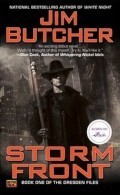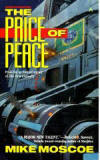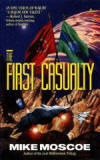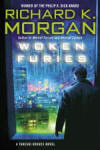Andreas Rosboch's Blog, page 60
August 21, 2011
They Also Serve (Society of Humanity III) – Mike Moscoe
 The third and final book in the Society of Humanity series sees Ray Longknife leading a exploratory expedition, and getting lost. The expedition finds the descendants of a ship's crew thought lost three hundred years ago. But all is not as it seems. The planet is literally alive with remnants of an ancient civilization. And it's not happy.
The third and final book in the Society of Humanity series sees Ray Longknife leading a exploratory expedition, and getting lost. The expedition finds the descendants of a ship's crew thought lost three hundred years ago. But all is not as it seems. The planet is literally alive with remnants of an ancient civilization. And it's not happy.
Unlike the somewhat flawed predecessor volumes, this is a very respectable story. The "planet as supercomputer" elements are interesting, as well as the evolution of the individual characters components of that computer. The contrast between the arriving expedition and the locals is also well done, with a good grasp of factional politics. All in all, a great conclusion to the series.
Note: Mike Moscoe is more well known under the pen name Mike Shepherd. The Society of Humanity series is set in the same universe as the Kris Longknife books, but several decades earlier.
Storm Front (The Dresden Files I) – Jim Butcher
 Harry Dresden is a private investigator of sorts. He is actually a wizard living in modern Chicago. In this novel, a mysterious woman hires him to find her husband. At the same time, in his capacity as police consultant on "unusual" cases, he is called in to assist in investigating a mysterious murder and soon finds himself implicated. To make matters worse, the White Council, a governing body of sorts for wizards, thinks he is guilty of crimes against the laws of magic.
Harry Dresden is a private investigator of sorts. He is actually a wizard living in modern Chicago. In this novel, a mysterious woman hires him to find her husband. At the same time, in his capacity as police consultant on "unusual" cases, he is called in to assist in investigating a mysterious murder and soon finds himself implicated. To make matters worse, the White Council, a governing body of sorts for wizards, thinks he is guilty of crimes against the laws of magic.
The novel reads like a noir detective story, down to the lack of funds and burning of bridges with the police. The wizard and magic aspect makes for an interesting wrinkle. Unfortunately, however, it does not make the book interesting enough. Dresden is a interesting character and well crafted, but after a while the book became a bit predictable. The whole thing is too deeply steeped in noir thriller cliché. Shame really, as the whole thing is based on a cool concept.
The Dresden Files series formed the basis for a short lived TV series of the same name.
August 19, 2011
The Price of Peace (Society of Humanity II) – Mike Moscoe
 After the war, Izzy Umboto (a minor character from the first book) is given independent command and a mandate to keep the peace on the rim. She and her crew uncover a slavery plot.
After the war, Izzy Umboto (a minor character from the first book) is given independent command and a mandate to keep the peace on the rim. She and her crew uncover a slavery plot.
Compared to the first book, this one is far more focused. There is a clear feeling of moving forward instead of flying about all over the place.
Note: Mike Moscoe is more well known under the pen name Mike Shepherd. The Society of Humanity series is set in the same universe as the Kris Longknife books, but several decades earlier.
The First Casualty (Society of Humanity I) – Mike Moscoe
 The Society of Humanity, more or less representing the "core" worlds, is at was with the "rim" worlds, where political power is wielded by a ruthless dictator. We follow protagonists from both sides of the conflict.
The Society of Humanity, more or less representing the "core" worlds, is at was with the "rim" worlds, where political power is wielded by a ruthless dictator. We follow protagonists from both sides of the conflict.
While it has some interesting battle scenes and good characterization, the plot is scattered and weak. As in the early Longknife books, I was left reeling by a rich backstory which wasn't adequately fleshed out. I had to pay real attention to seemingly throwaway comments from minor characters to fill in the social and political background. The book did serve as a decent introduction to the next two installments, introducing the main players.
Note: Mike Moscoe is more well known under the pen name Mike Shepherd. The Society of Humanity series is set in the same universe as the Kris Longknife books, but several decades earlier.
Mike Moscoe is more well known writing as Mike Shepherd. The Society of Humanity series is set several decades before the Kris Longknife books.
August 18, 2011
Woken Furies – Richard Morgan
 The third Takeshi Kovacs novel is just as violent and X-rated as the previous installments. Morgan has not lost his gift for film noir cool and deep cynicism. So far so good. However, while Altered Carbon was a tightly written masterpiece and Broken Angels had an intriguing plot device, Woken Furies is much less focused. Sometimes it seems like Morgan is just taking the reader on a guided tour of Kovacs' old stomping grounds on our hero's native Harlan's World. Granted, the guided tour is very very good, and Morgan's prose flows smoothly, but some plot elements deserved more attention and it all seems a bit contrived. For starters, more could have been done with the duplication of Kovacs.
The third Takeshi Kovacs novel is just as violent and X-rated as the previous installments. Morgan has not lost his gift for film noir cool and deep cynicism. So far so good. However, while Altered Carbon was a tightly written masterpiece and Broken Angels had an intriguing plot device, Woken Furies is much less focused. Sometimes it seems like Morgan is just taking the reader on a guided tour of Kovacs' old stomping grounds on our hero's native Harlan's World. Granted, the guided tour is very very good, and Morgan's prose flows smoothly, but some plot elements deserved more attention and it all seems a bit contrived. For starters, more could have been done with the duplication of Kovacs.







